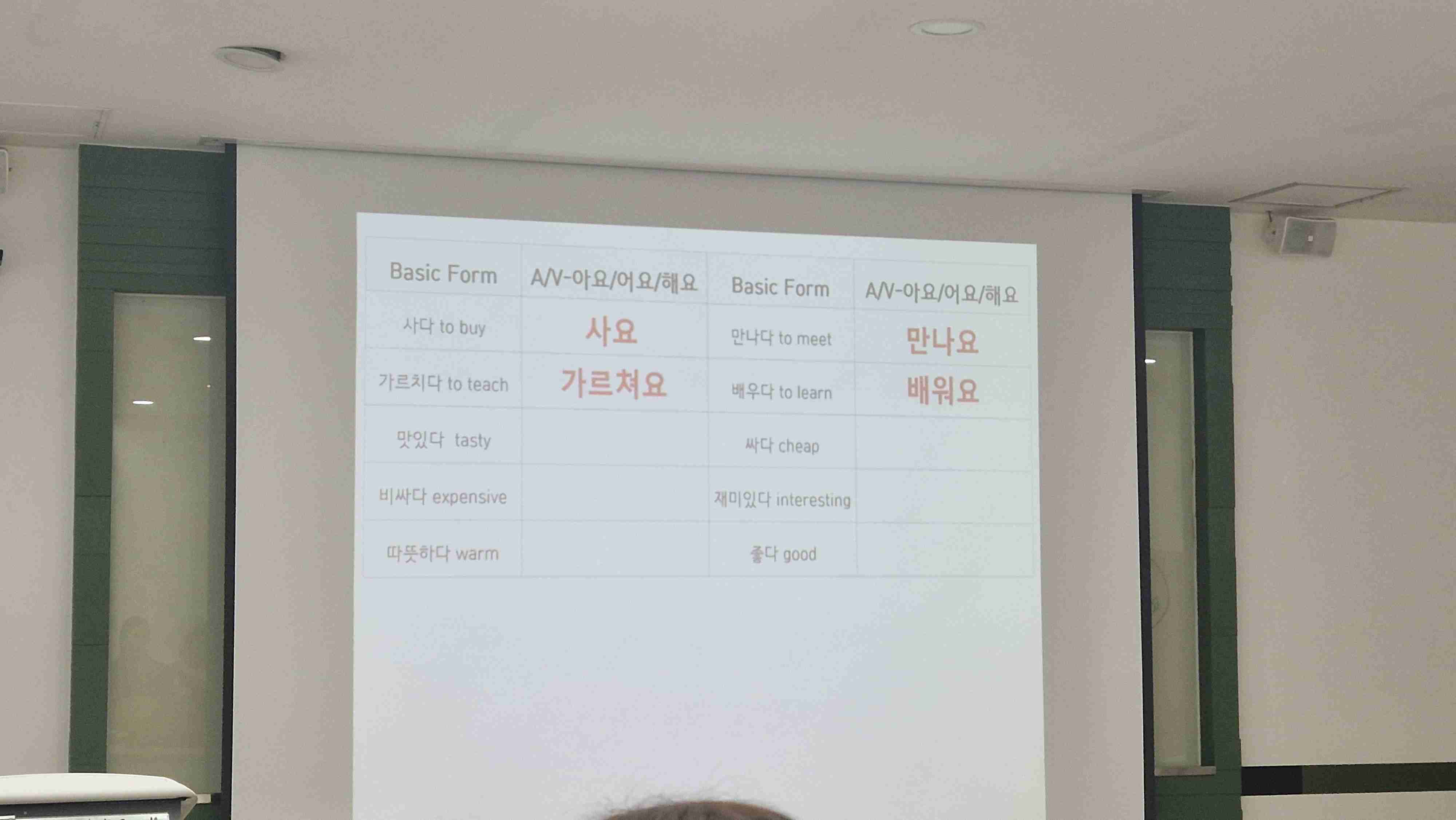Korean language
1/55
There's no tags or description
Looks like no tags are added yet.
Name | Mastery | Learn | Test | Matching | Spaced | Call with Kai |
|---|
No analytics yet
Send a link to your students to track their progress
56 Terms
Park
공원 (gong-won)
Mountain
산 (san)
Restroom
화장실 (hwa-jang-shil)
Gym
체육관 (che-yuk-gwan)
Restaurant
식당 (sik-dang)
Bank
은행 (eun-haeng)
Post office
우체국 (u-che-guk)
School
학교 (hak-gyo)
House
집 (jip)
Library
도서관 (do-seo-gwan)
Pharmacy
약국 (yak-guk)
Hospital
병원 (byeong-won)
Classroom
교실 (gyo-shil)
Parking lot
주차장 (ju-cha-jang)
Dormitory
기숙사 (gi-suk-sa)
Verb: To do
하다 / 해요
Verb: To do (the) laundry
빨래하다 / 빨래해요
Verb: To eat
먹다 / 먹어요
Verb: To watch
보다 / 봐요
Verb: To buy
사다 / 사요
Verb: To teach
가르치다 / 가르쳐요
Verb: To exercise
운동하다 / 운동해요
Verb: To clean
청소하다 / 청소해요
Verb: To read
읽다 / 읽어요
Verb: To drink
마시다 / 마셔요
Verb: To wear
입다 / 입어요
Verb: To meet
만나다 / 만나요
Verb: To learn
배우다 / 배워요
Verb: To be delicious
맛있다 / 맛있어요
Verb: To be cheap
싸다 / 싸요
Verb: To be expensive
비싸다 / 비싸요
To be interesting
재미있다 / 재미있어요
To be warm
따뜻하다 / 따뜻해요
Verb: To be good
좋다 / 좋아요
Now
지금
Today
오늘
Tomorrow
내일
These days
요즘
How do you ask "What time is it now?" in Korean?
지금 몇 시예요?

What does "시" mean when telling time in Korean?
"시" means "o'clock" and is used after the hour.
What does "분" mean when telling time in Korean?
"분" means "minute" and is used after the minutes.
What is the Korean word for "half" when referring to 30 minutes?
"반."
Do you need to add extra words for "AM" or "PM" in Korean?
Yes, "오전" is used for "AM," and "오후" is used for "PM," placed before the time.
What is the function of the marker "-에" in Korean?
"-에" is used to indicate the time when something takes place, such as in "일곱 시에 공부해요" (I study at 7 o'clock).
When is the particle "-에" NOT used in time expressions?
"-에" is not used after time words like "어제" (yesterday), "오늘" (today), and "내일" (tomorrow)
How do you express approximation in time?
Add "쯤" after the time, e.g., "여덟 시쯤에 먹어요" (I eat at about 8 o'clock).
List the days of the week in Korean.
월요일 (Monday)
화요일 (Tuesday)
수요일 (Wednesday)
목요일 (Thursday)
금요일 (Friday)
토요일 (Saturday)
일요일 (Sunday)
Name three Korean words for parts of the day.
아침 (morning)
점심 (midday, lunchtime)
저녁 (evening)
밤 (night)
오늘 (today)
How do you ask what day of the week someone does an activity in Korean?
Use "무슨 요일에 [activity]?" (What day of the week do you [activity]?), e.g., "무슨 요일에 태권도를 배워요?" (What day of the week do you learn Taekwondo?).
How do you ask for the date in Korean?
"오늘이 며칠이에요?" (What’s the date today?)
What are the spelling exceptions for June and October in Korean?
6월 (June) becomes 유월.
10월 (October) becomes 시월.
How do you say the months of the year in Korean?
1월 (일월): January
2월 (이월): February
3월 (삼월): March
4월 (사월): April
5월 (오월): May
6월 (유월): June (exception)
7월 (칠월): July
8월 (팔월): August
9월 (구월): September
10월 (시월): October (exception)
11월 (십일월): November
12월 (십이월): December
How do you say, "What about ~?" in Korean when making follow-up suggestions?
"그럼 ~은/는 어때요?" (Then, how about ~?)
How do you express past tense in Korean?
Use -았어요/었어요/했어요 depending on the verb or adjective ending:
하다 verbs → 했어요
Last vowel ㅏ or ㅗ → -았어요
All other cases → -었어요